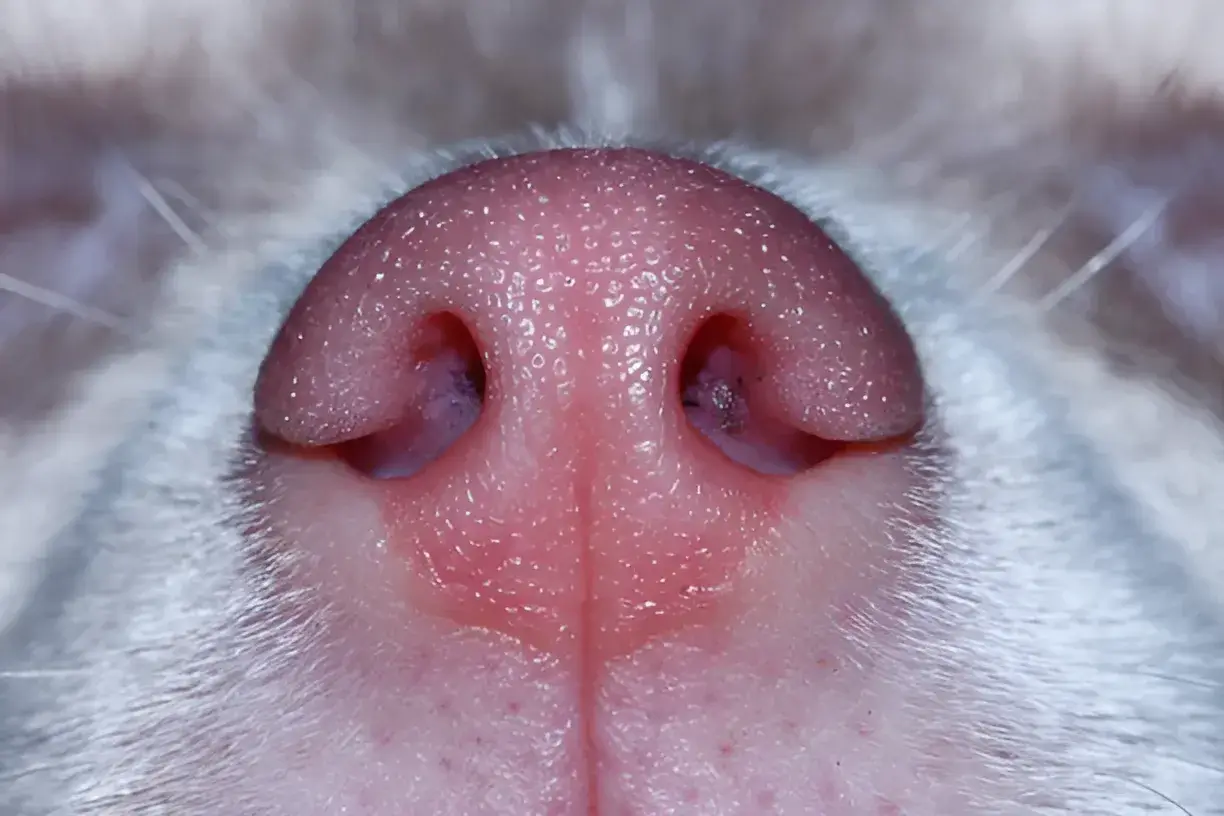Many dog breeds can have adorable pink noses, but it’s not just about looks! A dog’s pink nose tells a story about its genetics and sometimes its breed history. Let’s explore some popular and lesser-known breeds that sport pink noses, why this happens, and some care considerations.
Popular Pink-Nosed Pups
1. Boxers: Their playful personalities and short coats often go hand-in-hand (or paw-in-paw?) with light pink noses.
2. Dalmatians: Famous for their spots, many Dalmatians also have pink noses, sometimes dotted with black for extra charm.
3. Bull Terriers: These muscular dogs can have entirely pink noses or a mix of black and pink.
4. Doberman Pinschers: While best known for black and tan coats, some Dobermans carry a recessive gene that leads to light brown fur and a pinkish nose.
5. Poodles: Standard, Miniature, and Toy Poodles can occasionally have pink or liver-colored noses, making them even more charming.
Lesser-Known Pink Nose Possibilities

6. Siberian Huskies: Not every Husky has a black nose, some (especially those with lighter coat colors) boast a pink snow nose!
7. Irish Setters: Their beautiful red coats sometimes come with a delightful pink nose.
8. Samoyeds: These fluffy white dogs often have pink noses, especially noticeable against their snow-like fur.
9. Vizslas: Known for their rusty coats, Vizslas must have a nose that blends with their fur color, often resulting in a pinkish hue.
The Science of Pink: Pigments and Genetics
- Eumelanin: This pigment creates black, brown, and gray colors in dogs’ coats and noses. Low eumelanin levels result in pink.
- Pheomelanin: This produces red and yellow colors. Sometimes, a dog will have low eumelanin and high pheomelanin, giving a reddish-pink nose.
- Dudley Noses: This term, particularly used for Labrador Retrievers, refers to a complete lack of nose pigment.
Care Considerations
Sun Sensitivity: Dogs with pink noses may be more prone to sunburn. Apply dog-safe sunscreen, especially in summer.
No Health Worries: A pink nose is purely cosmetic and isn’t a sign of illness.
Cold Weather Care: If you live in a place with harsh winters, watch your pink-nosed pup for signs of a dry or cracked nose. Applying a small amount of dog-safe nose balm or a touch of coconut oil can soothe any discomfort.
Routine Vet Checks: A pink nose doesn’t change a dog’s overall health needs. Make sure your dog, regardless of nose color, gets yearly checkups at the vet for a thorough health assessment.
Dispelling the Myths

Some people think pink-nosed dogs might be weaker, less playful, or sillier than dogs with black noses. This is completely false! A pink nose doesn’t influence a dog’s personality or health in any way. Here are other common myths about pink-nosed pups:
Myth: Pink-nosed dogs are more prone to allergies. Nose color has no connection whatsoever to a dog’s allergies. Allergies are affected by other factors like genetics and environment.
Myth: Pink-nosed dogs can’t be working dogs. Many working dogs, including Dalmatians (originally firehouse dogs), some sled dogs, and livestock guardians, sport pink noses. Their work ethic depends on their breed and training, not their pigmentation.
Myth: Pink-nosed dogs are always albino. True albinism (complete lack of pigment in the skin, eyes, and fur) is rare in dogs. Most pink-nosed dogs simply have reduced pigmentation in their noses, not full albinism.
Conclusion
Whether they’re a playful Boxer, a dignified Doberman, or a fluffy Samoyed, pink-nosed dogs are unique and wonderful companions. Never judge a dog by its nose color alone!
I hope you find this post helpful and informative. If Yes’ feel free to share it with your friends!
Frequently Asked Question
Why do some pink noses have black spots?
This mixed pigmentation is often referred to as a “butterfly nose.” It’s a result of how the genes for color distribution work in that particular dog.
Is it rare for a dog to have a pink nose?
The rarity depends on the breed. In some breeds, pink noses are very common, while in others, it’s less likely.
What is it called when a dog has a pink nose?
There are a few terms:
Pink nose: The most general description.
Dudley nose: Often refers to Labrador Retrievers specifically with no pigment
Liver nose: Used for dogs with a brownish-pink nose.
Snow nose: When a dog’s nose lightens only in the winter.
Why does my white dog have a pink nose?
White fur often goes along with reduced pigmentation in the skin. This can lead to a pink nose. Sometimes this lack of pigmentation also leads to blue eyes.
Small dog breed with pink nose!
Examples include Chihuahuas, Toy Poodles, Maltese, and some French Bulldogs.
Medium-sized dog breed with pink nose!
Examples include Bulldogs, Pit Bull Terriers, some Siberian Huskies, and Vizslas.
Large dog breed with pink nose!
Examples include Dalmatians, Dobermans, Boxers, Samoyeds, and some Labrador Retrievers.
Dogs with pink noses and blue eyes!
While not super common, some breeds prone to both include Siberian Huskies, Weimaraners, and Australian Shepherds.
Can my dog’s nose color change throughout their life?
Yes, it’s possible! Puppies might start with light noses that darken. Some breeds have “snow nose” where it fades in winter. Age, sunlight, and even temperature can play a role.
How common are pink-nosed dogs?
It depends entirely on the breed. For certain breeds, pink noses are the standard, while in others, it’s a less frequent trait.
My puppy has a pink nose, will it stay that way?
It’s possible, but not guaranteed. Some puppies mature with darker noses, while others retain their adorable pinkness. Their breed heritage is a good indicator of what to expect.
Are dogs with pink noses at higher risk for skin cancer?
They can be slightly more at risk. Lighter noses have less protective melanin, so dogs with pink noses need extra sun protection, like dog-safe sunscreen.
Does a pink nose mean my dog is unhealthy?
Not at all! Pink noses are simply a variation in pigmentation and don’t indicate any health problems.
Can you give me examples of some less-common dog breeds that might have pink noses?
Yes! Some less-familiar breeds with a tendency towards pink noses include the Xoloitzcuintli (Mexican Hairless Dog), the Catahoula Leopard Dog, and the Peruvian Hairless Dog.

